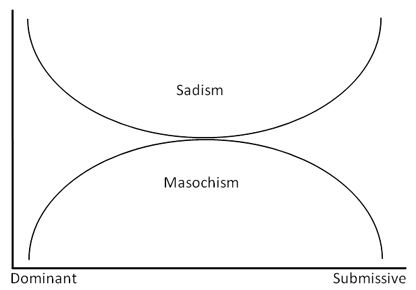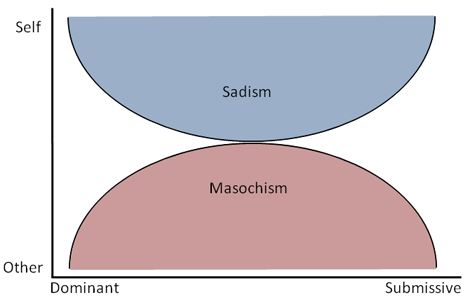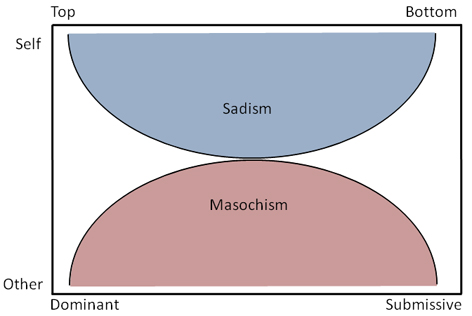Do you not know that the unrighteous will not inherit the kingdom of God? Do not be deceived! The sexually immoral, idolaters, adulterers, passive homosexual partners, practicing homosexuals, thieves, the greedy, drunkards, the verbally abusive, and swindlers will not inherit the kingdom of God.[1]
In an earlier essay I wrote that I didn’t want my quotation of Paul’s listing of the unrighteous (ἄδικοι, a form of ἄδικος)[2] “to come down disproportionately hard on those who favor the ‘Side A’ position discussed on the Gay Christian Network website.[3] My reasons can wait for another essay.” This is that essay, or more likely the beginning of a series of essays. As I think about it now I see my personal reasons falling under two distinct yet related headings: 1) my attempt to find some meaning for πορνεία apart from the “whatever you want” imprecision of sexual immorality; and, 2) I am a masochist.
I’ve already written some about πορνεία, so I’ll begin here with what I mean by masochism. I didn’t use the term sado-masochism deliberately, though my earliest thoughts on the subject started there. I thought Sadism and Masochism were a continuum associated with dominance and submission respectively (fig. 1).
In college I read the commentary included in an edition of Leopold von Sacher-Masoch’s “Venus in Furs.”[4] It was a while ago, my notes are gone, so I can’t credit the woman (I think it was a woman) who wrote the commentary. One thing she said resonated with me, something to the effect that a sadist would never be satisfied with a willing masochist. She began to distinguish Sadism from Masochism as she included dominance and submission within both categories. My graphical representation changed immediately (fig. 2).
I’ve stuck with this graphical representation as I tried to figure out what was on the other axis, what distinguished sadism from masochism. What I came up with is still a bit elusive even to me. I call it Self and Other, but I don’t necessarily mean selfishness and altruism (fig. 3).
Lisa, the dominatrix in “Exit to Eden,”[5] as she mused on the airplane about slaves in a slave market was totally wrapped up in the experience of the submissive. Her mission in life was to give them the submissive experience they craved. It excited her. She was a masochist as I understand it, a dominant masochist.
“I am in awe of the courage that it must take to submit with willingness and grace,” wrote Lady N in an essay[6] posted online titled Why I Love Male Submissives. “It inspires me to strive for greatness within myself, so that I may remain completely worthy of such a gift. Simultaneously humbled and enobled by pain and passion, he becomes a rare and beautiful creature that defies any simple description.” She, too, is a dominant masochist.
Conversely, the “pain slut”[7] who latches on to a dominant and berates and humiliates them in order to provoke them to the level of desired violence is a submissive sadist in my opinion. And a second look at even the opening reverie of “Venus in Furs” causes me to suspect that Severin,[8] Sacher-Masoch’s alter-ego, was never a masochist at all, but a submissive sadist who became in the end a dominant one. But this makes the terms submissive and dominant seem too masochist-centric to be of much use in describing Sadism. Perhaps I should close the loop and describe the “pain slut” as a bottom who tongue-lashes a top to incite the top to lash the bottom’s bottom harder and faster (fig. 4).
Sexuality to the non-Sadist and non-Masochist is about pleasure and honor. They assume that a “sado-masochist” likes pain and humiliation instead of, or confuses them for, pleasure and honor. I’ve read things online from both dominants/tops and submissives/bottoms that seem to support that point of view. But I don’t have any difficulty distinguishing between pleasure, pain, honor and humiliation. I would say (in theory at least) that they are interesting and unique flavors that are enjoyable to combine in different recipes with one’s spouse, willing spouse, that is (I am a masochist).
It is apparent to me that what I call masochism may be nothing more than something called sado-masochism filtered through the fruit of the Holy Spirit (love, joy, peace, patience, kindness, goodness, faithfulness, gentleness, and self-control).[9] But I’m going to continue as if my masochism has its own existence, something like I have been describing. I must face then that it may be nothing more than the fruit of being one of those given over in the desires of their hearts to impurity, to dishonor their bodies among themselves.[10] Consider Lady N’s ode to male submissives again:
He is John Barleycorn, consort and sacrifice. He is brutally degraded and taken for the most profane of uses, and thus a god worthy of worship and reverence. Crucified in leather, his flesh is violated and sanctified, celebrated and decorated by the bright blood roses of our passion. His body is the altar at which I worship. It is the sacred paradox, and it is the deepest truth and the greatest beauty that I can know in this life.
I am the respectful penitent and the savage goddess, and the scourge rises and falls to glorify as much as to humble. I am as deeply reverent as I am merciless to the sacrifice. Dea gratias[11] [“thanks be to God (Deo) Goddess (Dea)”], forever and ever, amen.
The sheer intensity of taking a consenting submissive and making him hurt and cry and suffer for me, the power and passion that is as hot and raw as the living hearts the Aztecs once tore from the chest of a willing sacrifice, that is what feeds me and fuels the flames of my desire.
Lady N’s reference to John Barleycorn probably has less to do with Jack London’s novel[12] than it does with this quote from Raven Kaldera on Pagan BDSM:[13] “There’s one other point to make that is uniquely pagan in worldview. Each spirit that gets called into a man-made object is a tiny reflection, a snapshot, a splinter, an avatar of a much greater spirit…When someone takes on the archetype of the Owned Slave, they allow into themselves a piece of the greater spirit that is All That Is Sacrificed That We May Live. This Spirit has many faces and names — the Sacred King, John Barleycorn, Iphigenia, Persephone, the Sacrificed Maiden, the Prey Animal, the Bull God and Goat God, Lugh, Baldur, the Corn Dollie, the Wicker Man, and so forth.” Here my masochism and my understanding of πορνεία seem to intersect.
The shape of my masochism was pretty much established by about nine or ten years of age, the fourth grade. I truly don’t remember what I was thinking, believing or doing that might have made me a fool in God’s eyes who exchanged the glory of the immortal God for an image resembling mortal human beings or birds or four-footed animals or reptiles.[14] And the idea—that the wrath of God [was] revealed from heaven against all [the] ungodliness and unrighteousness[15] of the nine-year-old (or younger) boy that I was—causes me to recoil some. And that recoil has made it difficult for me to fully embrace my masochism as God’s wrath: Therefore God gave them over in the desires of their hearts to impurity, to dishonor their bodies among themselves.[16]
It gives me some cause, however, beyond the fruit of Christ’s Spirit, to be patient with those whose homosexual desires are so deeply rooted in their childhoods that it seems like an integral part of who they are as human beings.




Pingback: Paul in Corinth | The Gospel and the Religious Mind
Pingback: My Reasons and My Reason, Part 8 | The Gospel and the Religious Mind
Pingback: Who Am I? Part 5 | The Gospel and the Religious Mind
Pingback: My Reasons and My Reason, Part 6 | The Gospel and the Religious Mind
Pingback: You Must Be Gentle, Part 3 | The Gospel and the Religious Mind
Pingback: Romans, Part 2 | The Gospel and the Religious Mind
Pingback: Immorality | The Gospel and the Religious Mind
Pingback: My Reasons and My Reason, Part 3 | The Gospel and the Religious Mind
Pingback: My Reasons and My Reason, Part 2 | The Gospel and the Religious Mind
Pingback: What is Sexual Immorality? | The Gospel and the Religious Mind
Pingback: Romans, Part 48 | The Gospel and the Religious Mind